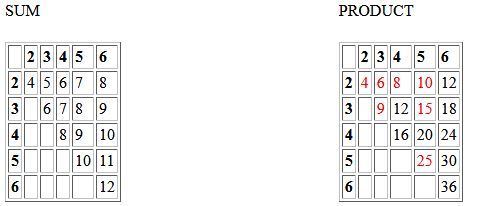Two numbers
Robert has two truth-telling friends Simon and Paul, who are both perfect logicians.
Robert says, "I've chosen two positive integers that are both greater than 1. I'm going to tell Simon their sum and Paul their product." He proceeds to do so and asks, "Now, can you guys guess my two numbers?"
Here are the responses:
- Simon: "I don't know Robert's numbers."
- Paul: "I don't know them either."
- Simon: "Hey, now I know."
- Paul: "Then I know them, too."
What are the two numbers and
Enter as your answer.
The answer is 19.
This section requires Javascript.
You are seeing this because something didn't load right. We suggest you, (a) try
refreshing the page, (b) enabling javascript if it is disabled on your browser and,
finally, (c)
loading the
non-javascript version of this page
. We're sorry about the hassle.
Here are the possible sums and products for the first few integers:
We use S for Simon and P for Paul.
S does not know the numbers, so the sum can not be 4 or 5, but it can be anything higher. For example, if the sum is 6, then the pair of numbers is either 3,3 or 2,4. S knows the numbers in the third step, so the choices can not be too many.
P can not deduce the two numbers from the product, so they can not be prime numbers. The simplest product he may have heard is made of three primes. Furthermore, one of the primes must be different from the other two, otherwise there is a unique answer: 2x2x2 can be broken up to 2x4 or 4x2, which yields 2,4 as the unique answer. On the other hand, the product 3x2x2=12 may correspond to 6,2 or 3,4. The product may also have four prime factors, or more, possibly all equal (for example 2x2x2x2 may correspond to 2,8 and 4,4). Red color in the table indicates products can be excluded, because P could deduce the two numbers right away.
Based on this argument 3,3 or 2,4 are excluded and S can not have 6 for the sum. Assume now that the sum is 7. The possible pairs are 3,4 and 2,5. But 2 and 5 are primes, and therefore only 3,4 is left. If S heard 7, and he learned that P does not know the answer, he can be certain that the numbers were 3,4.
What happens if we assume that the sum is greater than 7? In that case S has no chance of finding the answer. For example, if he heard 8, then just by knowing that the numbers are not primes (or made of three equal primes) is not enough for picking one of the three choices (3,5 is excluded, but 2,6 and 4,4 remains). For 9 the pair 2,7 is out, but 4,5 or 3,6 remains. As the sum increases the number of possible choices increases, and excluding the prime pairs (and numbers made of three equal primes) helps less and less.
Since after learning that P does not know the answer S knew the numbers, he must have heard 7, and the pair of numbers is 3,4.